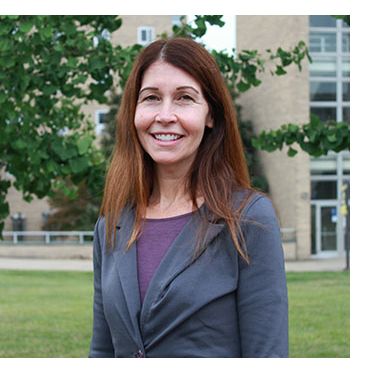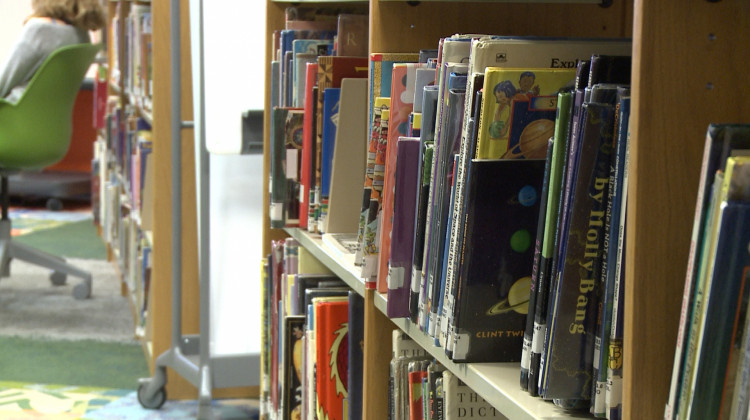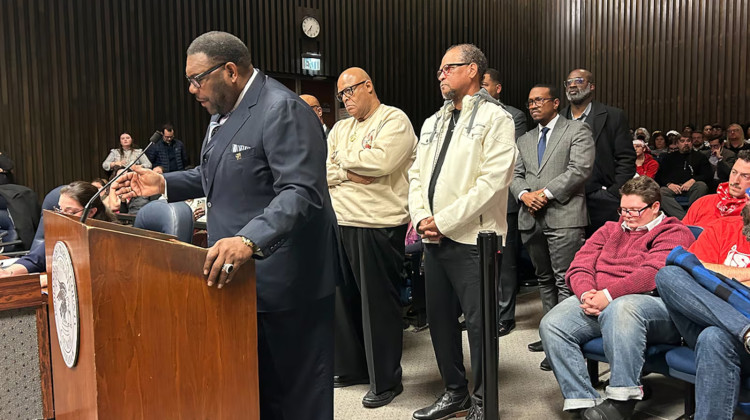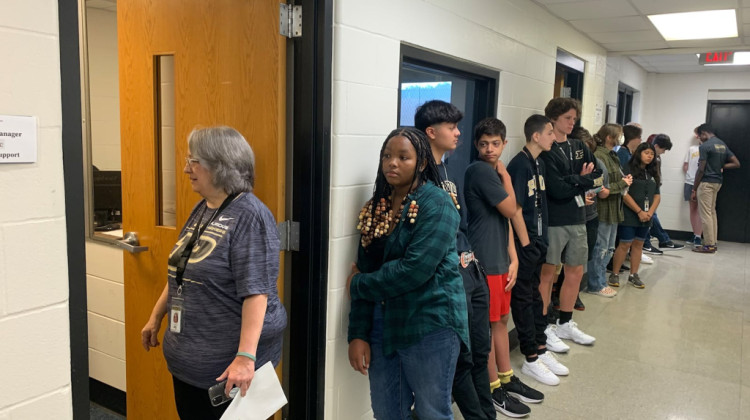Indiana lawmakers unanimously approved a bill during the recent legislative session that requires all Indiana teachers to use a new literacy practice – the science of reading. It’s a decades-old collection of research that provides educators with the skills needed to identify sounds and letter correspondence based on the way human brains process language, and use the five main components of reading – phonemic awareness, phonics, fluency, vocabulary, comprehension.
Beginning in 2024, educators will no longer be able to use popular reading methods like three-cueing. That’s when kids use pictures and context clues to guess unfamiliar words instead of relying on their reading knowledge to sound out a word. Some researchers, such as Jamey Peavler, a literacy instructor at Mount St. Joseph University in Ohio, believe the three-cueing strategy has contributed to Indiana’s low reading scores.  Peavler, who is also literacy consultant working with Indiana schools, says in order to better support elementary students, teachers need to be equipped with the proper instructional techniques.
Peavler, who is also literacy consultant working with Indiana schools, says in order to better support elementary students, teachers need to be equipped with the proper instructional techniques.
MORE: Will teaching reading science pull Indiana children out of a literacy decline?
A national study recently examined the effectiveness of the reading curriculum in teacher prep programs across the country, and gave some of Indiana’s top institutions – including Indiana University - Bloomington, Butler University – an F rating. Now educators, researchers and lawmakers hope implementing reading science into student teacher prep programs and elementary schools could turn things around.
WFYI’s Elizabeth Gabriel spoke with Peavler to learn how teaching kids to read should be based in science.
Gabriel: So, this is a big question, but why do you think Indianapolis — and even Indiana — has a literacy problem?
Peavler: I think for a long time in Indiana, we have two major universities — I could even add a third — that are primary producers of teachers. And those universities have been whole language universities, historically. And so I think when you consider where our teachers and our schools are coming from and the training that they've had, there's no question why our literacy rates are so low. States where there are more teacher prep programs aligned to reading science and have been doing that historically, have different literacy concerns. But I think there’s again, right in our backyard, we have many universities here that are notorious for not producing a phonics-based, explicit, evidence-based research-aligned teacher prep program for reading instruction.
Gabriel: So, and I feel like I've heard this a lot from educators. They go to school to learn how to be an educator, but they don't necessarily really feel prepared for the classroom. I guess why is that?
Peavler: Yeah. So it’s interesting that you would ask that what because that’s actually what I do now. So I work in higher ed and I prepare teachers for teaching. Most of the teachers I work with are in the graduate program, so they have come to this university with the idea of, ‘Gosh, I have the same experience, I was not prepared in my undergrad.’
So what’ I’m thinking is happening in a lot of schools, at least when I relate my experience, we spend a lot of time teaching teachers theories and pedagogy, and not enough time teaching them what it actually looks like to put those methods into practice. And part of that is, I think, is universities, you want to prepare teachers for no matter what environment they go in. And so most schools have choices about what curriculum they adopt, what their philosophies are. And so I feel like many universities probably want to play it safe, and just give this more generic introduction, and think that the curriculum will teach the teachers how to teach once they land in their assignment. And that is not accurate at all.
Gabriel: So if schools are teaching theories, and now we have state lawmakers — which have required schools to use the science of reading — how is that different than what people are learning to do when they're going to school to be an educator?
Peavler: Right. Oh, that’s really good because when I was in school, and again, this was the 1990s. And here we fast forward now, there's not a lot of different concepts being taught in childhood programs for preparing teachers. And so what's different about the science of reading, is it's incorporating things from other domains and other fields and professions like linguists, speech language pathology, cognitive science — which studies how we learn. And so all of these other fields and domains have contributed research that helps us understand that there are in fact scientifically based ways to teach reading. When I was in school, that was never introduced to me.
The idea was that the textbook that your school provides you will teach you how to teach students. So there was never anything about what about our language? And why are words in English spelled with a C or a K? And is there any logic to that? And it turns out there is and if you know linguistics, you'll know that. Why do we teach certain concepts specific ways, and there wasn't anything in my training around, ‘Well, there's a certain amount of repetition, and feedback and retrieval practice, you need to offer students for them to be effective learners.’ In my training, it was just do what the textbook tells you. So reading science completely flips the script.
Gabriel: And as a literacy consultant, who’s worked with other school districts across Indiana, can you talk about how much it will cost schools to switch over to using the science of reading?
Peavler: Oh, yeah. So the biggest shift that students in schools will need to make is changing the way instruction is delivered. And so the biggest investment is providing that training for teachers. It's not about materials. In fact, a highly effective and knowledgeable teacher can work wonders with no materials, or limited materials or materials that have been branded, as the opposite of science of reading. So the best investment is teacher training, and there are a lot of options available. We have some nonprofits in Indiana that provide training on structured literacy, which is a step towards reading science, for very little cost. Some are more costly, and take more time, but there's quite a range.
So in terms of putting a price tag on how much it would cost for each teacher, that would be a little difficult to do. But that's the greatest cost, but that's also the greatest return on investment. Because once you train someone to be effective, they will be effective every year for every group of students they have.
Whereas if we spend our money on materials, materials become dated, districts believe they have to be replaced every five or six years, we have to train teachers on the new materials. So that just continues to be a cost bleeding approach.
Gabriel: And I have to ask, we're investing in teacher training, which I feel like we've done for a while now. I guess, how do we know that this particular teacher training is the thing that will help our students?
Peavler: Right, and so a lot of the trainings we've invested in before, very balanced literacy oriented, three-cueing method. When I was a teacher, we were trained in balanced literacy, and we had specific providers and vendors come in and do that training and it was not cheap. But what we weren't asking was, where's the outcome data to show that this is effective? And so, I think for us to realign our priorities and look at what is the data show is working, then we can feel competent, that this is the shift that needs to be made, because the data is there to support that when schools implement a reading science model, and invest in their teacher training, student outcomes do improve.
Gabriel: Is there anything else you would like to add?
So critics of reading science often say, you know, it's just a phonics-driven way of teaching. And that if we do that we’ll take away the joy of reading — kids have to love to read. And really, it's a cyclical process, but there is a starting point. And typically it doesn't matter what you and I are talking about in terms of skill, we enjoy something that we're good at. I do not enjoy cooking because I am not good at it. And therefore I don't continue to cook.
And so there's this misconception that we have to get kids to love to read, and then they will want to read and try to read. And that's not accurate, we have to do both at the same time. We have to teach them the skills to be successful so that when they do pick up a text, they enjoy it, because they can do it. But then we also through the language comprehension of reading science is we read to students. So we start to pick up texts that they would never be able to read independently, and we read it to them.
Gabriel: Well, thank you for speaking with me, Jamie. I really appreciate
Peavler: It was nice to be here. Thank you.
Contact WFYI health reporter Elizabeth Gabriel at egabriel@wfyi.org.
 DONATE
DONATE







 Support WFYI. We can't do it without you.
Support WFYI. We can't do it without you.